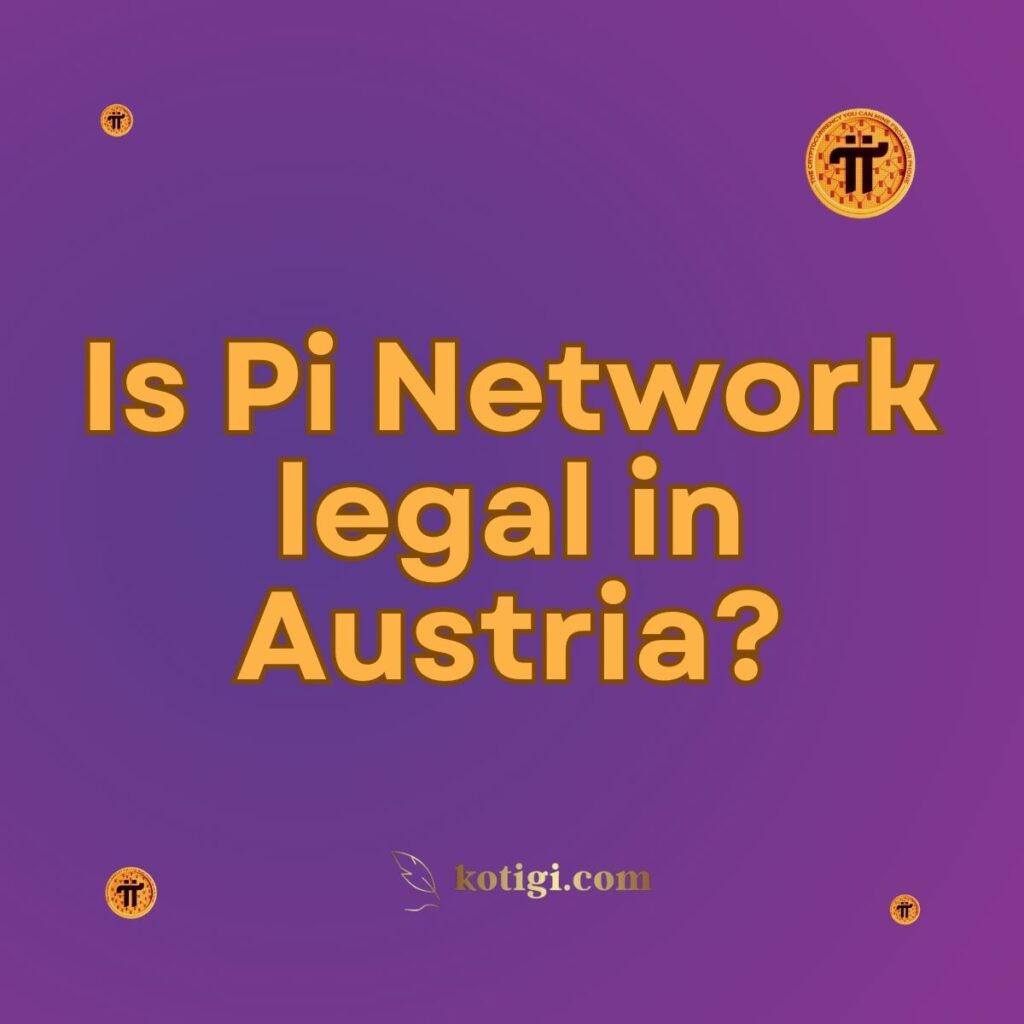
Is Pi Network legal in Austria?
Yes, Pi Network is legal in Austria. While the country does not have specific regulations for Pi Network or mobile mining, cryptocurrency activities are generally allowed as long as they comply with Austria’s financial and tax laws, including anti-money laundering (AML) requirements and income tax obligations.
Introduction
As Pi Network continues to expand its global footprint, many users in Austria are interested in participating in the mobile mining ecosystem. However, a common question arises: Is Pi Network legal in Austria? Understanding the legal landscape surrounding cryptocurrency in the country is essential for users who wish to engage with Pi Network without violating any laws.
In this article, we will explore the legality of Pi Network in Austria, including how the Austrian government views cryptocurrency, the tax implications, and the requirements for ensuring compliance with anti-money laundering regulations. We will also discuss how Austria’s progressive approach to blockchain technology aligns with Pi Network’s decentralized vision.
Overview of Cryptocurrency Regulations in Austria
Legal Status of Cryptocurrencies
In Austria, cryptocurrencies are legal, and platforms like Pi Network are allowed to operate without significant regulatory barriers. The Austrian government does not consider cryptocurrencies as legal tender, but they are viewed as commodities or assets. This legal classification means that individuals can mine, own, and trade cryptocurrencies like Pi as long as they comply with the relevant financial and tax regulations.
Austrian Pi Network users can legally mine Pi tokens using their mobile devices. However, the legal environment in Austria is subject to changes, and users should remain informed about any potential future laws targeting the cryptocurrency sector.
Government Stance on Cryptocurrency
Austria has shown a generally positive attitude toward blockchain technology and cryptocurrencies. The Financial Market Authority (FMA), Austria’s financial regulator, oversees digital asset activities to ensure they comply with existing laws, particularly regarding financial transparency and consumer protection.
While the FMA has issued warnings about the risks associated with unregulated cryptocurrencies, it has not taken any steps to ban platforms like Pi Network. As a result, Pi Network remains legal and accessible to users in Austria who follow the country’s financial and legal guidelines.
Compliance with AML and KYC Regulations
Austria’s Anti-Money Laundering Laws
Austria has strict anti-money laundering (AML) regulations that apply to cryptocurrency activities. The FMA requires any financial institution or platform dealing with cryptocurrencies to comply with AML laws, which aim to prevent illegal activities like money laundering and terrorist financing.
Although Pi Network is not currently categorized as a financial institution, users in Austria are expected to adhere to best practices, including completing the platform’s Know Your Customer (KYC) process. KYC helps ensure that all users are verified, minimizing the risk of illegal activities within the Pi Network ecosystem.
KYC Process on Pi Network
The KYC process is an essential part of Pi Network’s compliance strategy, ensuring that users are real individuals and not engaging in illicit activities. Austrian Pi Network users are encouraged to complete the KYC verification to align with both Pi Network’s internal policies and Austria’s financial regulations. Failing to verify your identity could limit your ability to fully participate in Pi Network’s ecosystem.
Taxation of Pi Network Tokens in Austria
Cryptocurrency Tax Guidelines
Cryptocurrency-related income in Austria, including any future financial gains from Pi tokens, is subject to taxation. The Federal Ministry of Finance (BMF) considers cryptocurrencies to be intangible assets, and earnings from their sale, mining, or trading are subject to capital gains tax or income tax, depending on the nature of the transactions.
For Pi Network users, this means that while Pi tokens are not yet tradable, once they become available on exchanges, any gains made from trading or using Pi tokens may be taxed. It is important for users to maintain accurate records of their Pi token balances, mining activities, and any profits or losses.
Reporting Cryptocurrency Earnings
Austrian residents who participate in Pi Network should be prepared to report any future earnings from Pi tokens on their annual tax returns. Failing to report cryptocurrency income could lead to legal consequences, including fines or penalties. Users should consult with tax professionals to ensure they are meeting their legal obligations once Pi tokens become tradable.
Financial and Legal Risks of Pi Network Participation
Financial Risks
As with any cryptocurrency, Pi Network involves a level of financial risk. Cryptocurrencies are volatile, and the value of Pi tokens could fluctuate once they are tradable. Austrian users should be cautious and aware of the potential for both profits and losses when dealing with Pi tokens.
It’s also important to note that cryptocurrencies are not backed by any government or central authority. Therefore, any financial losses sustained by users will not be covered by consumer protection laws in Austria.
Legal Compliance
While Pi Network is legal in Austria, users must comply with the country’s financial laws, including AML regulations and tax obligations. Failing to follow these guidelines could result in legal consequences, such as fines or penalties. By staying informed and complying with the KYC process, users can minimize their legal risks.
Austria’s Position on Blockchain Innovation
Government Support for Blockchain Technology
Austria is a forward-thinking country when it comes to adopting blockchain technology. The Austrian government has implemented various blockchain initiatives and encourages the development of decentralized platforms. This open approach aligns well with Pi Network’s vision of creating a decentralized, secure, and scalable cryptocurrency that is accessible to everyone.
Integration of Blockchain in Austrian Industries
Several sectors in Austria, including finance, healthcare, and supply chain management, are exploring the integration of blockchain solutions to improve transparency and efficiency. Pi Network’s decentralized approach to mobile mining could potentially contribute to these sectors by providing an innovative, user-friendly method for engaging with blockchain technology.
The Future of Cryptocurrency Regulation in Austria
Potential Regulatory Changes
Although Austria is currently open to cryptocurrencies and blockchain technology, future regulatory developments could impact how Pi Network operates within the country. As cryptocurrency adoption grows, the Austrian government may introduce more comprehensive laws governing the use, trading, and taxation of digital assets.
For Pi Network users in Austria, it is essential to stay informed about potential regulatory shifts that could affect their participation in the network. Keeping up with announcements from the Federal Ministry of Finance and the Financial Market Authority will help users navigate any future legal changes.
Preparing for Regulatory Shifts
Austrian Pi Network users should prepare for potential changes by maintaining accurate financial records, completing the KYC process, and ensuring that they comply with all relevant laws. By staying proactive, users can minimize the risk of facing legal challenges in the future.
Conclusion
Pi Network is legal in Austria, and there are no significant restrictions preventing users from participating in its mobile mining activities. However, users must adhere to Austria’s existing financial regulations, including anti-money laundering laws and tax obligations, to remain compliant. As Pi tokens become tradable, Austrian users should be prepared to report any earnings and pay applicable taxes.
Austria’s open approach to blockchain technology supports the continued growth of platforms like Pi Network, making it an ideal environment for blockchain innovation. While Pi Network is currently legal, users should stay informed about potential regulatory changes that could impact how the platform operates within the country.
Key Takeaways
- Legal Status: Pi Network is legal in Austria, and users can participate in mobile mining without significant legal barriers.
- Cryptocurrency Taxation: Future earnings from Pi tokens will be subject to taxation, and users should keep detailed records for tax reporting purposes.
- AML and KYC Compliance: Completing the KYC process is important for adhering to anti-money laundering regulations in Austria.
- Financial and Legal Risks: Users should be aware of the potential risks associated with cryptocurrency and the need for legal compliance.
- Blockchain Innovation: Austria supports the development of blockchain technology, aligning with Pi Network’s decentralized vision.
- Future Regulations: Users should stay informed about potential regulatory changes that could affect the legality of Pi Network in Austria.




